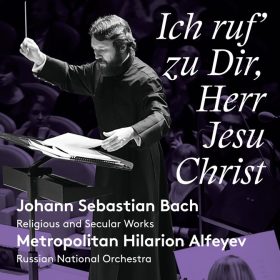“Bach’s music is not a museum piece. Living in modern times, we have full rights to use the full scale of modern means of expression in order to translate to the listener the outstanding grandeur and timeless beauty of his music.”
Our album of “Bach / Hilarion – Ich ruf’ zu Dir, Herr Jesu Christ” performed by Russian National Orchestra, Stephan Genz, conducted by Metropolitan Hilarion Alfeyev will be released on July,1st, 2017. Metropolitan Hilarion Alfeyev, the conductor and composer shared his deep connection with Bach’s music religiously. Read his personal notes below.
In classical music, I do not know anything more sublime, meaningful, profound and spiritual than Bach’s works. Bach is a colossus; his music contains a universal element that is all-embracing. As the Russian poet Joseph Brodsky said, “In every piece of music there is Bach, in each of us there is God.”
Bach was a person who combined a magnificent and unsurpassed skill in composition: rare diversity, melodic beauty and very profound spirituality.Bach’s music, filled with spiritual symbolism and spiritual content, is relevant for people of all times. His music will never become obsolete because it touches the central themes of human life.
Bach’s music is deeply mystical because it is based on an experience of prayer and ministry to God which transcends confessional boundaries and is the heritage of all humanity. His music is permeated by a feeling of love of God, of standing in God’s presence, of awe before Him. One can say that music for him was the worship of God.Bach’s music is deeply Christocentric. This is reflected not only in his magnificent “St Matthew Passion”, “St John Passion”, “Christmas Oratorio”, but also in much smaller pieces, such as the Choral Prelude “Ich ruf’ zu Dir, Herr Jesu Christ.” This title was chosen for the selection of Bach’s music recorded on the current recording, which combines both his religious and secular music.

As a composer, I have always been fascinated by the grandeur and truly symphonic scale of many of Bach’s works, including, notably, his Passacaglia and Fugue for organ. This is why, following the example of Respighi and Stokowsky, I made my own arrangement of this composition for symphony orchestra. In Bach’s time, there was no such instrument as modern symphony orchestra. All orchestras were chamber and small, while it was the organ which was able to produce powerful and magnificent sounds. In my arrangement of the Passacaglia and Fugue I tried to make the orchestra imitate an organ, with its many octave registers, while at the same attempting to show the immense inner and spiritual power of Bach’s music.
As a conductor, I feel deeply indebted to such interpreters of Bach’s works as Karl Richter and Herbert von Karajan. I am not at all fascinated by the modern fashion to play Bach in the so-called “authentic” style, whatever it may mean, when the orchestra is tuned one tone lower (which is unbearable for people with perfect pitch), the tempos are too fast, and the entire manner of performance is artificially oriented towards what is believed to be peculiar for Bach’s epoch.Bach’s music is not a museum piece. Living in modern times, we have full rights to use the full scale of modern means of expression in order to translate to the listener the outstanding grandeur and timeless beauty of his music. This was the vision behind the current recording of his works.
-Metropolitan Hilarion Alfeyev


